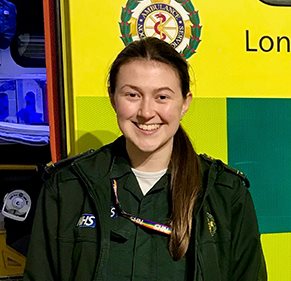Rachel Harris, a St George's alumna who graduated in Paramedic Science BSc in 2020, shares her story for International Women's Day.
Rachel has worked in a number of healthcare roles including being a mobile carer and working in a dementia-care unit. She now works for the London Ambulance Service. Below, she discusses how she adapted to the Covid-19 pandemic, which began when she was in her final year of study. Alongside her studies, Rachel decided to volunteer as part of the National Helping Hands Childcare Scheme, providing childcare to children of frontline workers.
Adapting to change during the pandemic
 Due to lockdown, face-to-face learning was suspended and we could not complete our clinical placement for safety reasons. I decided to use this time to complete volunteer community work, including providing chilcare for frontline workers, as many NHS staff were redeployed to the frontline and left without childcare due to closure of schools and nurseries.
Due to lockdown, face-to-face learning was suspended and we could not complete our clinical placement for safety reasons. I decided to use this time to complete volunteer community work, including providing chilcare for frontline workers, as many NHS staff were redeployed to the frontline and left without childcare due to closure of schools and nurseries.
I also participated in a successful vaccine trial, which given me a unique insight into the extensive research leading to the vaccine rollout.
Since I graduated from St George's, I have experienced several surges of Covid-19 cases from the frontline.
It's always daunting to start a new job, but to begin my career as a Paramedic during a pandemic involving a novel virus certainly was a unique challenge!
As an ambulance service, we have seen an unprecedented increase in demand for our services. This meant I was more frequently exposed to severely unwell patients.
Often patients and their relatives were frightened and loved ones were not allowed to visit hospitals, meaning we played a crucial role in emotional support for these patients.
We worked collaboratively with voluntary Police and fire responders, who drove our ambulances to support our response, increasing the number of ambulances able to attend patients.
There was a lot of additional learning, as I had to ensure I was always up to date with Covid-19 clinical guidance and isolation rules to ensure I provided patients with the most appropriate care. For example, we had to learn to respond wearing PPE, including respirator masks and Tyvek suits for cardiac arrests, which can be difficult to work and communicate in.
My experience as a woman in the Ambulance Service
I have been very fortunate not to have faced any barriers in entering the Ambulance Service compared to my male counterparts.
However, there have been occasions where I have worked as an all- female ambulance crew and attended patients (and their relatives) who have been disappointed to see female ambulance staff, stating that they requested a male crew (typically on jobs which might require manual handling and physical strength).
It is always positive to be able to change that perspective and prove that women are just as capable at providing optimum patient care.
What International Women's Day means to me
I think International Women’s Day is about celebrating what women have achieved, often in spite of adversity, whilst honouring the unique strengths we all possess as individuals and the contributions we bring to society.
Representation matters. So, highlighting women’s achievements and dedicating platforms to amplify female voices is not only empowering, but essential.
It is also about recognising that there is still work to be done. We can celebrate progression, yet acknowledge there is still a way to go if we are to strive for equity.
There are many challenges women continue to face both within this country and on a global scale, such as violence against women, which I’m saddened to see is still so prevalent.
We must continue to promote diversity and uplift women from all backgrounds to achieve great things. Looking forward, I hope that we continue to see an increase in diversity across leadership roles with more women, particularly those from black and minority ethnic groups, in managerial positions.
Careers advice for other women
I would actively encourage women to pursue a career in STEM (science, technology, engineering, and mathematics).
STEM industries are still male-dominated, yet diversity within this sector is vital and women continue to contribute towards significant advancements in this field.
For any women looking to become a paramedic; I would recommend gaining experience within the healthcare sector. Not only will this be good preparation for the clinical role, but will give you an idea of whether the career would be an occupation you will enjoy.
Whilst training for the role, you will encounter many different people following the same career path who you might compare yourself to. Do not let this discourage you.
There is not one set personality type for this role, we all bring our own unique assets to the job. If you are passionate about patient care, are willing to learn and are keen to work hard then go for it.
In life, you may have experiences that lead you to reconsider your career plans, and this is okay. It’s never too late to change career paths and begin learning again; many people have more than one career in life, and your well-being is priority.
Find out more about International Women's Day and read more stories from the St George's community.